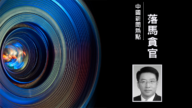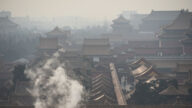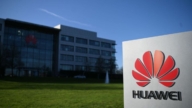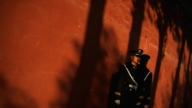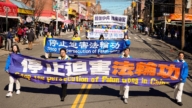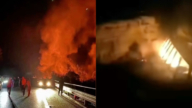【新唐人2013年06月06日讯】美国《国际先驱论坛报》网路版,6月4号刊登长文指出,现任中共高层中,不少人经历了1989年的政治风暴,他们与1989年的那场民主运动有着密切和矛盾的关系。是什么关系﹖请看本台记者的报导。
《国际先驱论坛报》的文章开篇就提到,1989年4月,400名中国政治精英聚集在北京,连续四天焦虑的辩论著国家的未来。
组织那次会议的,时任中国体制改革研究所所长陈一咨说:“不可能再召开像那次那样,每个人都愿意直抒己见的会议了。”
但几天以后,天安门广场爆发了抗议活动,与会者的人生从此走上了截然不同的道路。
现任中共25名政治局高官中,有6人参加了那次会议,其中包括现任的总理李克强、国家副主席李源潮、中纪委书记王岐山、以及全国政协主席俞正声等;另一些与会者,有的被指控支持抗议活动而被监禁或者流亡国外。
时政评论家陈破空:“不仅学生、市民、工人、甚至包括农民都支持学生。而且像《人民日报》、中直机关(中央直属机关)这些单位,很多人站出来造了共产党的反,抗议政府,站到学生一边。即便共产党内部,政治局常委里边,5个人就有2个是反对镇压的。人大常委会里边,1个委员长、6个副委员长都反对镇压。而元老里边,包括习近平的父亲习仲勋就反对镇压。”
旅美时政评论家陈破空指出,现在能登上中共高位的,都是内部讨价还价的结果,像受到元老猜忌的李源潮、汪洋,仕途受影响。
《国际先驱论坛报》的文章还指出,在六四镇压之前的80年代后期,中国政治环境一度相对宽松自由,李克强在“北大”读书期间,就与当时参加“北大”竞选、“六四”后流亡美国的异见人士胡平和王军涛有来往。王军涛曾回忆说,李克强当时和他们有许多相同观点。
而流亡美国的政治异见人士陈一咨也透露,他曾和王岐山有过多次长谈,在1988年也和李克强作过长谈。他的印象是,他们当时相对的比较开明。但报导中,王军涛说,“在(中共)党内生存,你必须成为一个机会主义者。”
政论家胡平也表示,在89民运时期,中央一些部门1/3的人都上过街、游过行,在体制内高层,同情学生的也占很大比例,甚至现在成了毛左派的那些著名知识份子,当时都是参加民运的。
美国中文杂志《北京之春》主编胡平:“体制内这些人,继续顺着官往上爬的这些人,他们思想发生了很大的变化。当然像李克强、李源潮这一代人都是文革后的第一批大学生,他们的精神成长是在80年代。可是他们后来的想法就变得已经非常远了。”
胡平指出,20多年来,体制内的很多人,为了保住自己的权位而装聋作哑。
胡平:“特别是在六四之后这个局面之下,要不断的压制异议的运动、压制维权人士,去打压法轮功这些自由信仰者。开头不情愿,但你要保住工作你就得做,越做越多。”
胡平还透露,当时歌唱家李双江坚决参加绝食活动;原《新华社》记者王晨在听到开枪后气愤的要退党,但后来却当上了中共的核心喉舌——新闻办主任。
胡平表示,留在体制内的人,不可避免的参与了很多坏事。
陈破空则认为,习近平没有背负“六四”血债,应该跟当年的“屠夫”保持距离。如果他继续投利益集团所好,仍然封锁网路、监控异议人士,向既得利益集团表功,不仅他将无所作为,还背叛他的父亲。
陈破空说,现在是考验习近平智慧的时候了。
采访/易如 编辑/宋风 后制/葛雷
US Media: Top Politicians Linked to June 4
International Herald Tribune (US) online edition
published a long article about June 4.
It pointed out that within the current leadership
of the Chinese Communist Party (CCP),
many experienced political turmoil in 1989.
They have a close and controversial relationship
with the democracy movement of 1989.
What is the relationship? Let’s look at the facts.
At the beginning of the article,
it mentioned, that in April 1989,
400 Chinese political elite gathered in Beijing for
a debate on four consecutive days about the country’s future.
Chen Yizi, the former director of the Chinese government
institute that helped organizer that meeting said:
“Afterwards it was impossible to hold another meeting
like it, in which everyone was willing to debate different points of view.”
A few days later, the Tiananmen Square protests broke out,
and the lives of the participants took on
radically different turns and twists.
Among officials in the CCP Politburo,
six attended that Meeting.
They include the incumbent Premier Li Keqiang,
Vice President Li Yuanchao,
secretary of the Central Discipline Inspection Wang Qishan,
and CPPCC Chairman Yu Zhengsheng.
Some participants were accused of supporting the protests,
and so that were imprisoned or exiled.
Political critic Chen Pokong:“Not only other students, but
citizens, workers, and even farmers supported the students.
In People’s Daily, organs directly under the central authority,
a lot of people stood up against the CCP and government,
and stood on the side of the students.
Even inside the CCP, among the Politburo Standing
Committee members, two of five were against repression.
In NPC Standing Committee, a chairman and
6 vice chairman all opposed the repression.
Among senior members, Xi Zhongxun (Xi Jinping’s father)
was against the repression.”
Political critic Chen Pokong pointed out that
those who can get into high level positions,
are the result of internal bargaining.
Those doubted by senior members, like Li Yuanchao,
Wang Yang, their careers were affected.
The article also pointed out that
before the June 4 event, in the late 1980s,
China has a relatively relaxed political environment.
When Li Keqiang studied in Beijing University, he had
communications with dissidents Hu Ping and Wang Juntao
who had participated in the election in the university,
but was exiled after the June 4 event.
Wang Juntao recalled that Li Keqiang then
held many of the same views as them.
The political dissident in exile in US, Chen Yizi also revealed
he had had many long conversations with Wang Qishan,
and also had a long talk with Li Keqiang in 1988.
His impression was that they were relatively more liberal then.
But Wang Juntao said,“To survive within the CCP,
you have to become an opportunist.”
Political commentator Hu Ping also said that
in the 1989 pro-democracy period, in some central
departments, 1/3 of staff went into the street for a march.
Within the upper levels of the system, a large proportion
were in sympathy with the students,
even those who now became famous leftist intellectuals,
had participated in that democracy movement.
Hu Ping, editor-in-chief of Beijing Spring,
a Chinese magazine in US said:
“People within the system, that continued to climb upwards,
their thinking had undergone drastic changes.
Of course, people like Li Keqiang, Li Yuanchao, were the first
generation of students after the Cultural Revolution,
and their spiritual growth was in the 1980s.
But later their thoughts went very far adrift.”
Hu Ping pointed out that in the past 20 years, a lot of people
within the system kept silent in order to keep their positions.
Hu Ping: “Especially after June 4, it (CCP) continued to
suppress dissent movements, activists and Falun Gong believers.
At the beginning, they were reluctant, but had to keep on
imposing it to keep their positions. So they did more.”
Hu Ping also revealed that, singer Li Shuangjiang
resolutely participated in a hunger strike at that time;
Former Xinhua News Agency reporter Wang Chen
got angry after hearing the shots and wished to resign,
but later on, Wang became Director of the
core mouthpiece of the CCP – News Office.
Hu Ping said that people that stay within the system
have inevitably been involved in a lot of bad deeds.
Chen Pokong believes that Xi does not have a blood debt to
the June 4 event, and should distance himself from the killers.
If he continues to block the network, monitor dissidents,
to favor the interest groups, he will not have any success,
and also betray his father.
Chen Pokong said that now is the time to test Xi Jinping.



